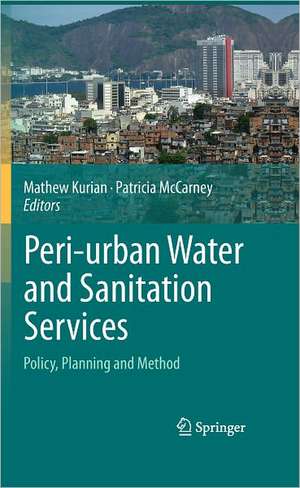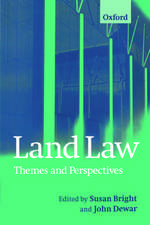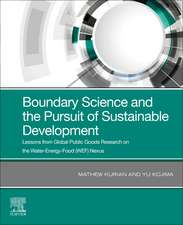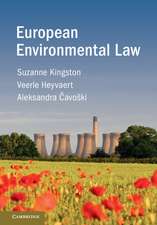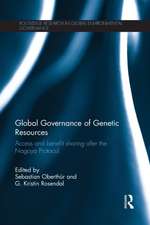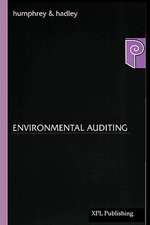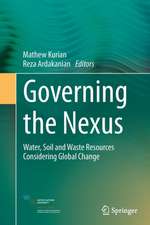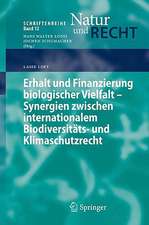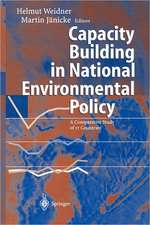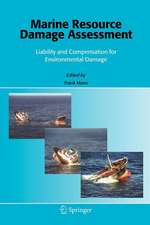Peri-urban Water and Sanitation Services: Policy, Planning and Method
Editat de Mathew Kurian, Patricia McCarneyen Limba Engleză Hardback – 20 aug 2010
| Toate formatele și edițiile | Preț | Express |
|---|---|---|
| Paperback (1) | 946.24 lei 43-57 zile | |
| SPRINGER NETHERLANDS – 19 oct 2014 | 946.24 lei 43-57 zile | |
| Hardback (1) | 951.47 lei 43-57 zile | |
| SPRINGER NETHERLANDS – 20 aug 2010 | 951.47 lei 43-57 zile |
Preț: 951.47 lei
Preț vechi: 1160.32 lei
-18% Nou
Puncte Express: 1427
Preț estimativ în valută:
182.12€ • 197.89$ • 153.08£
182.12€ • 197.89$ • 153.08£
Carte tipărită la comandă
Livrare economică 21 aprilie-05 mai
Preluare comenzi: 021 569.72.76
Specificații
ISBN-13: 9789048194247
ISBN-10: 9048194245
Pagini: 313
Ilustrații: XXXI, 300 p.
Dimensiuni: 155 x 235 x 23 mm
Greutate: 0.62 kg
Ediția:2010
Editura: SPRINGER NETHERLANDS
Colecția Springer
Locul publicării:Dordrecht, Netherlands
ISBN-10: 9048194245
Pagini: 313
Ilustrații: XXXI, 300 p.
Dimensiuni: 155 x 235 x 23 mm
Greutate: 0.62 kg
Ediția:2010
Editura: SPRINGER NETHERLANDS
Colecția Springer
Locul publicării:Dordrecht, Netherlands
Public țintă
Professional/practitionerCuprins
Neither Rural nor Urban: Service Delivery Options That Work for the Peri-urban Poor.- Prospects for Resource Recovery Through Wastewater Reuse.- Climate-Based Risks in Cities.- Wastewater Management Under the Dutch Water Boards: Any Lessons for Developing Countries?.- Financing the Millennium Development Goals (MDGs) for Water and Sanitation: Issues and Options.- Budget Support for Local Government: Theory and Practice.- Information’s Role in Adaptive Groundwater Management.- Making Sense of Human–Environment Interaction: Policy Guidance Under Conditions of Imperfect Data.- Approaches to Economic and Environmental Valuation of Domestic Wastewater.- Benchmarking Water Services Delivery.- Planning Clinics: A Primer.- Conclusions: Governance Challenges in Urban and Peri-urban Areas.
Notă biografică
Dr. Mathew Kurian is Academic Officer and leads the Capacity Development and Governance unit at United Nations University Institute for Integrated Management of Material Fluxes and of Resources (UNU-FLORES). Prior to joining UNU-FLORES, he served as Senior Water and Sanitation Specialist at Water and Sanitation Programme (WSP) of The World Bank where he led policy advocacy efforts related to rural water supply, wastewater reuse, and climate adaptation options in secondary towns. He began his career as a Robert McNamara Fellow at the World Bank where his work on land tenure reform was hosted by the Tata Energy Research Institute (TERI), New Delhi.
Upon completing his PhD in Development Studies from the Institute of Social Studies (ISS), Erasmus University, The Hague, Netherlands, Dr. Kurian was employed as Associate Expert (Dutch Ministry of Foreign Affairs) at International Water Management Institute (IWMI-CGIAR) where he undertook assessments of soil and water conservation interventions in the Mekong and Nile river basins. In 2009 as member of faculty at UNESCO-IHE, Delft, Dr. Kurian led the development of a policy note on urban sanitation and the Millennium Development Goals (MDGs) for the Directorate General of International Cooperation (DGIS) in the Netherlands. While still at UNESCO-IHE, Dr. Kurian developed an online e-learning course on governance of water and sanitation services in developing countries.
He has published in the area of water institutions and policy and has mentored students of the MSc programme in environment and development planning while on the faculty of University College London (UCL). His experience in the field of capacity development includes training civil servants and managers of water utilities in Iran and Tanzania, consulting assignments withthe Asian Development Bank (ADB), Philippines and teaching undergraduate courses in human geography at the University of British Columbia (UBC) Vancouver, Canada. In his current function, he leads the design of public policy research, policy advocacy in support of evidence-based decision making and fund raising to support establishment of a nexus observatory network.
Upon completing his PhD in Development Studies from the Institute of Social Studies (ISS), Erasmus University, The Hague, Netherlands, Dr. Kurian was employed as Associate Expert (Dutch Ministry of Foreign Affairs) at International Water Management Institute (IWMI-CGIAR) where he undertook assessments of soil and water conservation interventions in the Mekong and Nile river basins. In 2009 as member of faculty at UNESCO-IHE, Delft, Dr. Kurian led the development of a policy note on urban sanitation and the Millennium Development Goals (MDGs) for the Directorate General of International Cooperation (DGIS) in the Netherlands. While still at UNESCO-IHE, Dr. Kurian developed an online e-learning course on governance of water and sanitation services in developing countries.
He has published in the area of water institutions and policy and has mentored students of the MSc programme in environment and development planning while on the faculty of University College London (UCL). His experience in the field of capacity development includes training civil servants and managers of water utilities in Iran and Tanzania, consulting assignments withthe Asian Development Bank (ADB), Philippines and teaching undergraduate courses in human geography at the University of British Columbia (UBC) Vancouver, Canada. In his current function, he leads the design of public policy research, policy advocacy in support of evidence-based decision making and fund raising to support establishment of a nexus observatory network.
Textul de pe ultima copertă
More than 2.6 billion people in the developing world lack access to safe water and sanitation services. The Millennium Development Goal (MDG) target is to halve the number of people without access to improved services such as a sustainable source of water supply and connection to a sewer network by 2015. That target is unlikely to be met. If there is anything that can be learnt from European development experience it is that institutional reform occurs incrementally when politically enfranchised urban populations perceive a threat to their material well-being due to contamination of water sources. Peri-urban Water and Sanitation Services, a collection of papers initially developed to support a distance-learning course at UNESCO-IHE Institute for Water Education, Delft, The Netherlands, challenges professionals to pursue water services dilemmas within a broader developmental framework that addresses issues of autonomy and accountability intrinsic to intergovernmental relations. This book draws on literature at the interface of common pool resources, co-production, new public management and political ecology to discuss important policy concerns that relate to rural-urban transformation, budget support, wastewater reuse and performance benchmarking. ‘This collection of work by some of the most important researchers on socio-ecological aspects of water and sanitation is timely. By highlighting the importance of behaviour, society and ecology on the management of water and sanitation, the editors are highlighting an area of work that has largely been neglected. For instance, why is it that so many technical fixes exist, and yet in practice, few successful projects are ever brought to scale?’ Mark Redwood, Program Leader, Urban Poverty and Environment Program, International Development Research Centre (IDRC), Ottawa, Canada ‘With global urban population now larger than rural, opening of public-private relationships and opportunities, and the globalisation of technology and capital, can needs of citizens for clean and affordable water and sanitation services be met? This book argues that the terrain is rapidly changing and provides an evidence-based approach not only to technology but also to governance systems that mediate access to public services.’ Gita Sen, Professor, Centre for Public Policy, Indian Institute of Management, Bangalore, India
Caracteristici
Includes case studies of developing countries and contrasted with experience from Europe Written by experts in the field with experiences drawn from institutions in Europe, North America, Asia, Africa and South America Discusses practical tools for decision makers that include concepts of benchmarking, methods of economic and environmental valuation and planning clinics Preface by Prof. Elinor Ostrom, 2009 Nobel Laureate in Economic Sciences Includes supplementary material: sn.pub/extras
